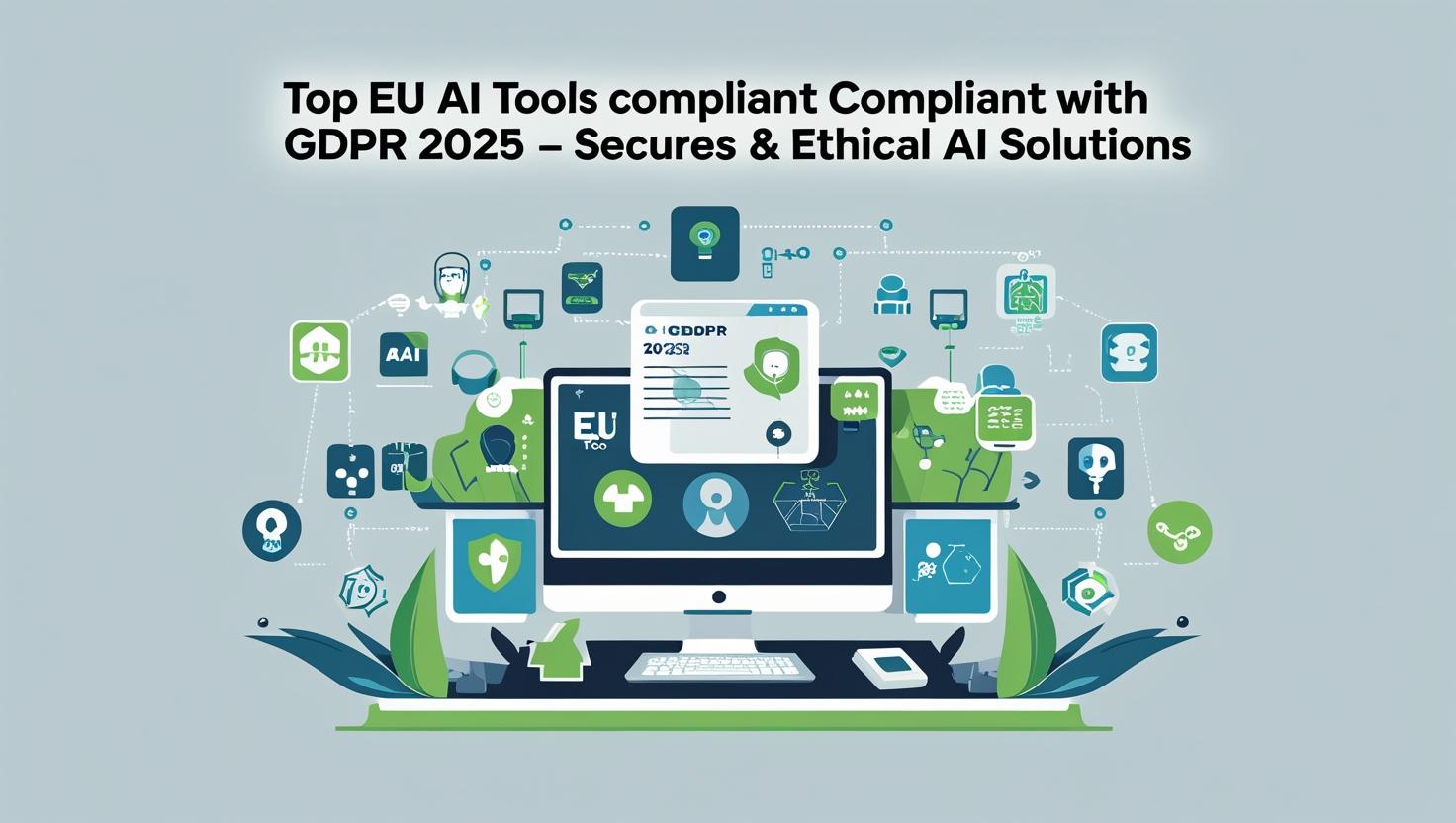Top EU AI Tools Compliant with GDPR 2025 – Secure & Ethical AI Solutions
Artificial Intelligence is revolutionizing industries across Europe, but GDPR compliance remains a critical requirement for organizations leveraging AI solutions. With the upcoming changes in EU AI regulations and heightened enforcement of privacy laws in 2025, businesses must ensure that their AI tools prioritize data protection, transparency, and lawful processing. Below, we present a detailed guide to the top AI tools in the EU that meet GDPR compliance standards while delivering exceptional performance.
1. DeepL – GDPR-Compliant AI Translation Leader
DeepL has become the go-to AI translation service for enterprises operating within the EU. With its headquarters in Germany, DeepL complies strictly with GDPR data processing regulations by hosting servers within the EU and encrypting all user data.
Key GDPR Features:
-
All data processed within EU data centers.
-
No retention of translation content.
-
Transparent privacy policy aligned with Article 13 of GDPR.
Use Cases:
-
Accurate multilingual communication.
-
Secure document translations for legal, healthcare, and government sectors.
2. Aleph Alpha – European AI Language Model Pioneer
Based in Heidelberg, Germany, Aleph Alpha is Europe’s answer to global AI giants. Unlike U.S.-based AI providers, Aleph Alpha offers complete data sovereignty, ensuring client information remains within EU jurisdictions.
Key GDPR Features:
-
Fully on-premises deployment options for sensitive industries.
-
Comprehensive data anonymization techniques.
-
Explicit consent management for all data handling.
Use Cases:
-
Advanced natural language processing (NLP) for research and public services.
-
Secure AI integrations in banking and defense sectors.
3. Seldon – GDPR-Safe AI Deployment Framework
Seldon is an open-source AI deployment platform widely used by European organizations to manage, monitor, and explain AI models. With a strong focus on explainable AI (XAI), Seldon ensures compliance with GDPR’s “right to explanation” under Article 22.
Key GDPR Features:
-
Model transparency with interpretability tools.
-
Automated privacy checks before deployment.
-
EU-hosted infrastructure options.
Use Cases:
-
Deploying AI models in finance, healthcare, and government agencies.
-
Monitoring compliance in real-time AI pipelines.
4. Corti – GDPR-Compliant AI for Healthcare
Corti is a Denmark-based AI tool designed for healthcare professionals, particularly emergency call handlers and clinicians. Its AI algorithms help detect illnesses faster while adhering to strict patient data protection laws.
Key GDPR Features:
-
Health data processed only within GDPR-compliant servers.
-
No sharing of identifiable patient data with third parties.
-
Compliance with EU Medical Device Regulation (MDR) alongside GDPR.
Use Cases:
-
Real-time voice analysis for emergency services.
-
AI-assisted patient triage in hospitals.
5. Mostly AI – Synthetic Data for Privacy-First AI
Vienna-based Mostly AI specializes in generating synthetic datasets that mimic real data without exposing personal information. This technology ensures organizations can develop AI models without risking GDPR violations.
Key GDPR Features:
-
Fully anonymized synthetic datasets.
-
Eliminates re-identification risks under Recital 26 GDPR.
-
Data never leaves EU jurisdictions.
Use Cases:
-
AI training in financial services without exposing customer details.
-
Privacy-preserving analytics in healthcare.
6. Mindtech – Ethical AI Vision Platform
Mindtech focuses on ethical and GDPR-compliant AI solutions for computer vision. It provides synthetic image data to train vision-based AI without compromising privacy rights.
Key GDPR Features:
-
No use of real-world personal images.
-
Synthetic images prevent biometric data misuse.
-
Transparency logs for all AI training data sources.
Use Cases:
-
Retail analytics without CCTV privacy breaches.
-
Autonomous vehicle training with synthetic vision data.
7. Spacy (EU Implementations) – GDPR-Friendly NLP
While SpaCy is an open-source NLP library, several EU-based cloud providers now offer GDPR-compliant hosting and processing for its models. These services ensure sensitive data processed through SpaCy remains under EU legal protection.
Key GDPR Features:
-
Secure EU-based model hosting.
-
Encryption for all data in transit and at rest.
-
Custom deployments for regulated industries.
Use Cases:
-
Automating document classification.
-
Extracting insights from sensitive datasets securely.
8. Viso Suite – GDPR-Compliant AI for IoT and Vision
Viso Suite, based in Switzerland, offers an end-to-end AI platform for computer vision applications that comply with GDPR and Swiss privacy laws.
Key GDPR Features:
-
Edge processing to avoid sending raw data to external servers.
-
Granular consent management for video and image capture.
-
Compliance reports for audits.
Use Cases:
-
Smart city monitoring within privacy constraints.
-
GDPR-safe workplace safety AI systems.
Key Considerations for Choosing a GDPR-Compliant AI Tool in 2025
When selecting an AI tool that aligns with GDPR, organizations must assess the following factors:
-
Data Residency: Ensure all data is processed within EU or GDPR-equivalent jurisdictions.
-
Anonymization & Pseudonymization: Minimize personal data exposure through privacy-enhancing techniques.
-
Right to Explanation: Confirm that the AI system can explain automated decision-making outcomes.
-
Explicit Consent: Implement mechanisms for collecting and managing user consent in compliance with Articles 6 and 7.
-
Third-Party Integrations: Vet external APIs and tools for GDPR adherence.
The Future of GDPR-Compliant AI in Europe
By 2025, GDPR compliance will go hand-in-hand with AI regulation under the EU AI Act. Businesses adopting AI must ensure ethical, transparent, and lawful data processing from the outset. Choosing tools developed within Europe or by providers committed to GDPR ensures a competitive advantage while avoiding costly fines.
Organizations that integrate privacy-by-design principles into their AI strategies will not only meet compliance requirements but also earn consumer trust—a critical asset in the AI-driven economy.

